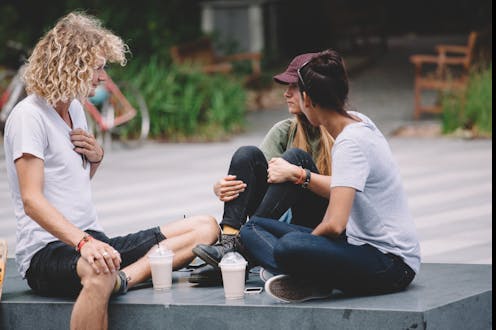The Gap will never close if Aboriginal and Torres Strait Islander students don’t feel safe on university campuses
- Written by Sharlene Leroy-Dyer, Associate Director (PRME) Indigenous Engagement, The University of Queensland

Readers please be advised this article contains references to sexual assault.
Aboriginal and/or Torres Strait Islander students are more likely to be sexually harassed in a university context than any other students. This is one finding from the 2021 National Student Safety Survey report, released this month[1].
The report found 7.8% of Aboriginal and/or Torres Strait Islander students, compared with 4.5% of other students, had been sexually assaulted in a “university context” such as at events, places or social occasions arranged or supported by a university, or where students or staff from a person’s university were present.
This includes both on and off campus, in person or online. Aboriginal and/or Torres Strait Islander students (6.3%) were found to be more likely than other students (3.9%) to be told or suspect another student had been sexually assaulted and more likely to experience or witness sexual harassment.
Sexual assault and sexual harassment are widely recognised as human rights issues, and marginalised populations such as Aboriginal and Torres Strait Islander women are at particular risk of having human rights abuses perpetrated against them.
Education is a human right, and the lack of educational outcomes for Aboriginal and Torres Strait Islander peoples in this country is alarming.
Addressing such violence is not only a safety issue, but ensures there is not another barrier standing in the way of educational self-determination.
Read more: Consent education needs Blak voices for the safety and well-being of young First Nations people[2]
The findings of the report
The report, which surveyed 43,819 students from 38 universities across Australia, found troubling patterns of sexual assault and sexual harassment in greater numbers towards students who identify as Aboriginal and/or Torres Strait Islander, LGBTIQA+ or with a disability. Sexual harassment and assault often intersect with other forms of harassment including racism, homophobia and ableism, further compounding the experience and impact on victim/survivors.
Sexual harassment is an unwelcome sexual advance, request for sexual favours or other conduct of a sexual nature which offends, humiliates and/or intimidates a person. Whereas sexual assault refers to sexual contact or behaviour that occurs without explicit consent of the victim.
The study found one in five (21.4%) Aboriginal and/or Torres Strait Islander students had been sexually harassed in a university context, compared with 16% of students who did not identify as Aboriginal and/or Torres Strait Islander. In addition, one in eight (12.0%) Aboriginal and/or Torres Strait Islander students had been sexually harassed in a university context in the past 12 months compared with 8.0% of other students and are more likely to witness this happening to others.
Aboriginal and/or Torres Strait Islander students were less likely than other students to feel safe on campus (76.2%) and felt less respected by staff (83.9%) and by other students (81.2%). How can we ever “Close the Gap[3]” on educational outcomes for Aboriginal and/or Torres Strait Islander peoples with statistics like this?
Impacts on education and safety
The report states that majority of Aboriginal and Torres Strait Islander students in higher education in Australia identify as a female. As the (Wiyi Yani U Thangani Report[4] reflects, “Aboriginal and Torres Strait Islander women and girls have remarkable skills, knowledge and boundless potential”. These are strong future matriarchs on their educational journey to fulfil their dreams and assist their communities. However, university spaces have historically been and continue to be places of under-representation for Aboriginal and/or Torres Strait Islander students.
According to federal government figures[5], only 1.8% of the higher education student population is Aboriginal and Torres Strait Islander, with an attrition rate of 35% in 2019.
Even with the positive impacts of Indigenous centres, the findings of the survey demonstrate Aboriginal and Torres Strait Islander students face potentially unsafe classrooms and unsafe environments within the broader university. The Australian higher education sector needs to ensure that university spaces are culturally safe, inclusive and welcoming.
A whole of university approach to sexual violence on campus has proven unsuccessful, despite enacting plans to ensure our campuses are safer. What is being done to influence better behaviour in the broader society?
Surely federal and state governments must bear some of the responsibility. However, if Brittany Higgins is any indication, the government is failing women on several levels.
Read more: Increased incarceration of First Nations women is interwoven with the experience of violence and trauma[7]
Recommended ways forward
The federal government in particular, must respond to the sexual violence faced by Aboriginal and/or Torres Strait Islander higher education students and implement the Respect@Work Sexual Harassment National Enquiry Report 2020[8] recommendations prioritising the safety of students on university campuses.
The National Student Safety Survey report calls for the acknowledgement of the role of gender, as well as intersecting discrimination and marginalisation in driving sexual harassment and sexual assault.
The sector must take proactive measures to promote safety and respect in: residential colleges, between staff and students and in learning environments for Aboriginal and/or Torres Strait Islander students, gender and sexuality diverse students and those with a disability.
All students should be aware of how to report instances they have experienced or witnessed and feel safe, supported and respected to do so. Students should never feel that they are facing blame or have their experience minimised.
References
- ^ released this month (www.nsss.edu.au)
- ^ Consent education needs Blak voices for the safety and well-being of young First Nations people (theconversation.com)
- ^ Close the Gap (www.closingthegap.gov.au)
- ^ (Wiyi Yani U Thangani Report (humanrights.gov.au)
- ^ federal government figures (www.indigenoushpf.gov.au)
- ^ GettyImages (www.gettyimages.com.au)
- ^ Increased incarceration of First Nations women is interwoven with the experience of violence and trauma (theconversation.com)
- ^ Respect@Work Sexual Harassment National Enquiry Report 2020 (humanrights.gov.au)

















